Crab Apple Gardenerz nurture a community, and poetry, toward goal of feeding the hungry
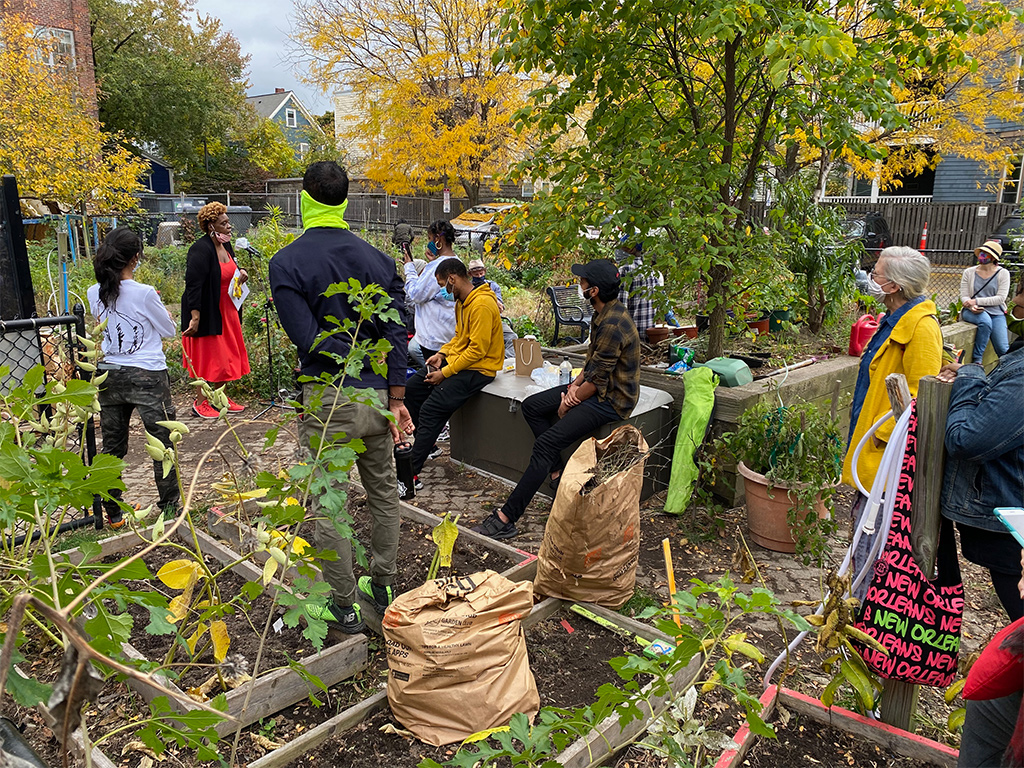
Toni Bee reads during an Oct. 24 event called Poets In The Garden at the Squirrel Brand Community Gardens in The Port. (Photo: Marc Levy)
The Crab Apple Gardenerz got Karened, but they didn’t let it stop them.
The goal was to be out in nature safely during coronavirus and growing food that could be shared with the community, and it was disappointing to see plots in the Squirrel Brand Community Garden in The Port neighborhood going unused. Trying to use a couple of those small plots that looked neglected to the newly formed Gardenerz resulted in a call to police from the Cambridge Highlands resident who had been named steward through the city’s community garden program.
The claim: “Vigilante gardeners” had destroyed flowers in the plots and taken tilled soil worth a combined $1,200.
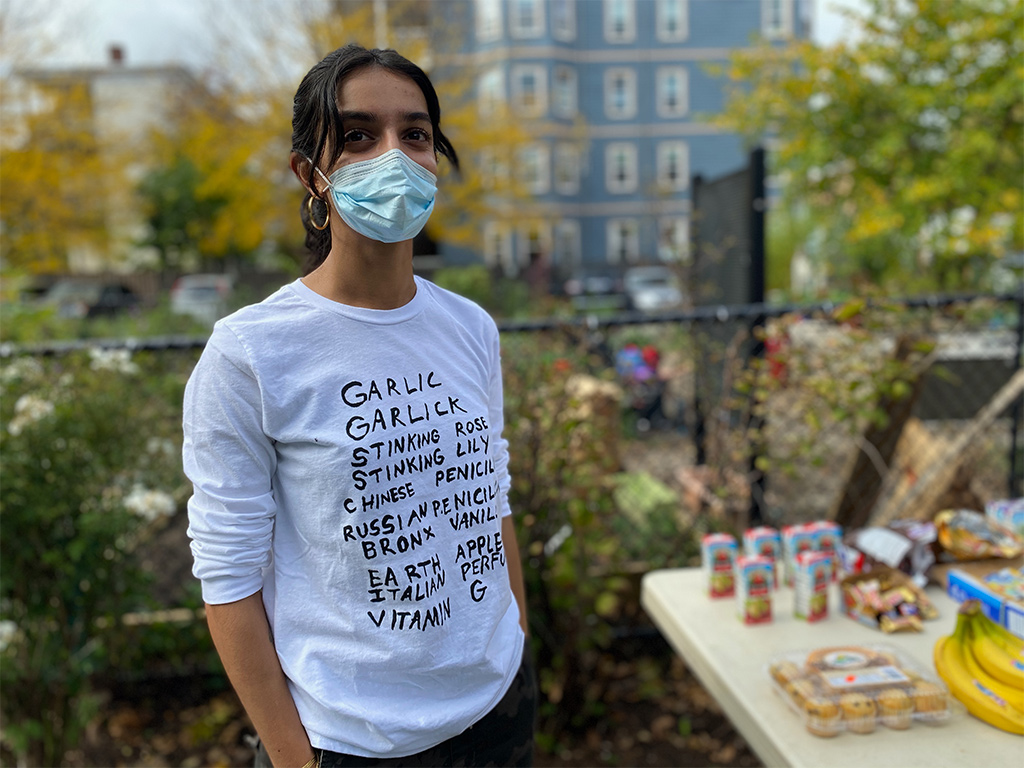
Maham Rizvi, a cofounder of the Crab Apple Gardenerz, said having police called on the group by another community garden steward was “extremely disheartening.” (Photo: Marc Levy)
When police officer Michael Nickerson suggested contacting city officials running the program, the complainant “insisted on a police report,” according to that Oct. 1 report.
Scenarios like this have played out countless times across the nation: White people calling police on people of color for things that don’t sound like crimes at all. Barbecuing. Asking for a dog to be put on a leash. “Vigilante gardening.” The dangerously overreactive domain of the people who’ve come to be known as Karens.
The complaint went nowhere through the intervention of Department of Public Works city engineer Kathy Watkins, who told the Gardenerz it had made police “laugh,” said Maham Rizvi, a founder of the group with poet Toni Bee and community activist Santos Carrasquillo.
Still, it “felt like a low blow. For a short time, we did fear repercussions,” Rizvi said. “It was a shock. It was extremely disheartening to learn a fellow resident and gardener could be interested in calling the police instead of gardening with us, especially in the racial atmosphere of this summer.”
Nor was it the group’s only worries about police based around the simple pleasures of gathering outdoors, which they have answered by asserting their rights to keep doing what they’re doing – and to make poetry and peaceful community out of it.
Venturing into the garden
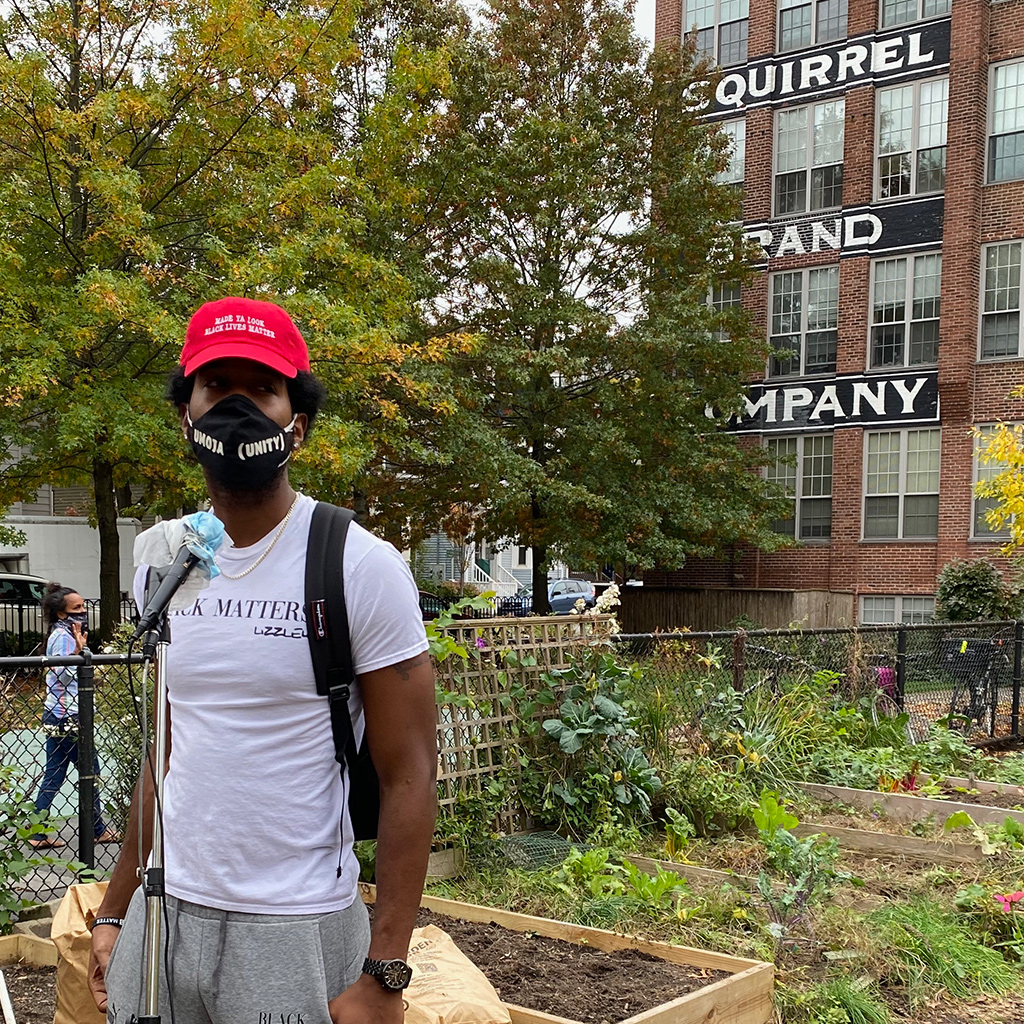
Educator and rapper Elon Fyfield takes his turn at the mic during the Oct. 24 event. (Photo: Marc Levy)
The Squirrel Brands Salted Nut Co. (maker of the taffy candy known as the Squirrel Nut Zipper, the namesake of that 1990s swing band) had operated at 12 Boardman St. from 1915 to 1999, when it was bought and moved to Texas. The nonprofit Just-A-Start turned the factory into 18 affordable apartments, winning awards for historic preservation from the National Trust, and responding to public input calling for a park and the preservation of community gardens.
Bee had lived in Squirrel Brands since 2007 without venturing into the garden outside her window, where she “never saw people who look like me,” she said Oct. 24 at a Poets In The Garden event. It drew a masked crowd of some three dozen people in person – more watched by livestream – to hear and recite poems, enjoy snacks, explore the greenery and take away some free Swiss chard.
Carrasquillo turned her around on that. As cofounder of the Kensley Project and Goree Freedom House, he had access to a Squirrel Brand Community Garden plot stewarded by the Community Arts Center a few minutes’ walk away on Windsor Street. He had a vision, which he explained during Poets In The Garden: “So we can stay in Cambridge with its high rents, let’s feed our families, survive the pandemic and continue to coexist.”
“Grocery store prices are going up. Food insecurity is obvious. So we banded together to grow more food and encourage urban agriculture and community,” he said.
He became “The Glue” of the group that would become the Crab Apple Gardenerz, Bee said. She was “The Poet.” Rizvi, who has a degree in agriculture and food science from the University of Gastronomic Sciences in Pollenzo, Italy, was “The Scientist.”
Seeding despite setbacks
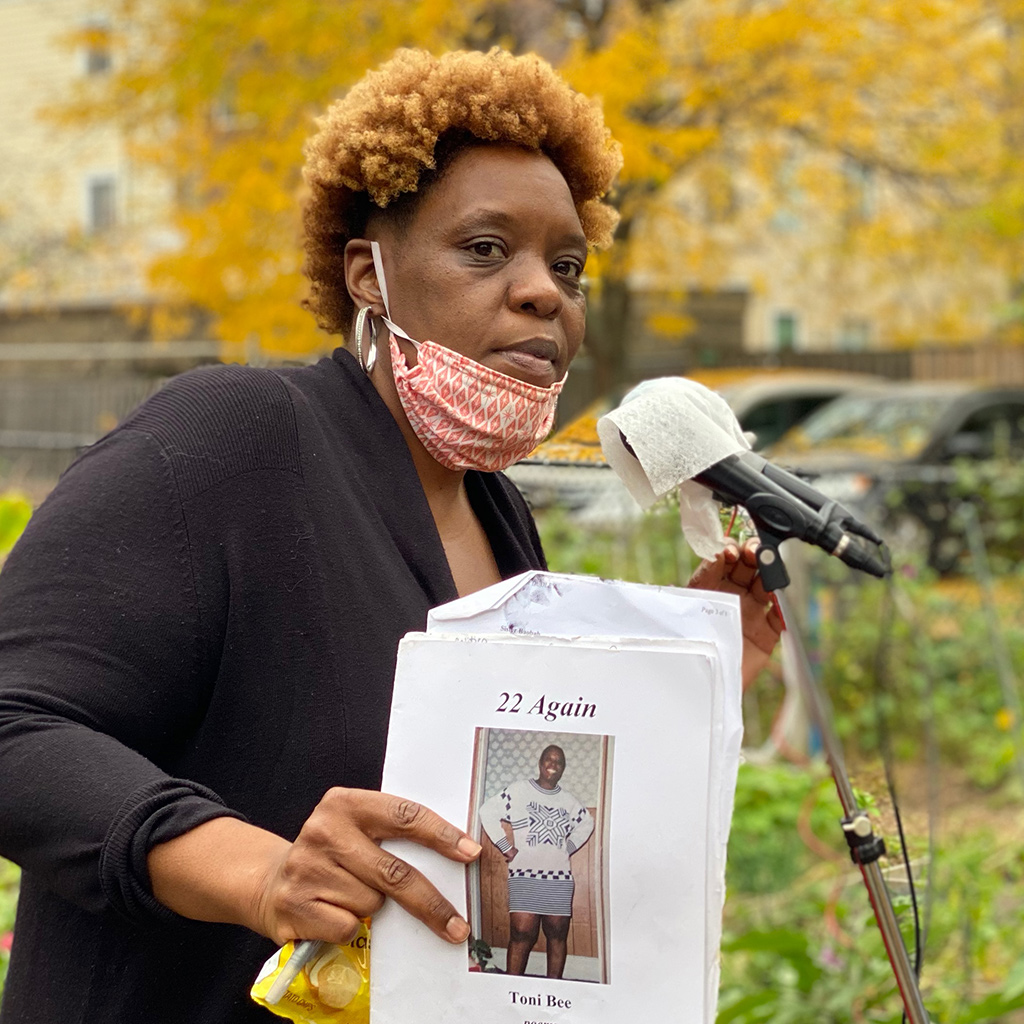
Bee says police have shown up all too frequently at events she’s held outside her Squirrel Brand Apartments home. (Photo: Marc Levy)
With Rizvi as a guide, they cultivated mint, hung it upside down to dry and made tea for regular Tea in the Garden events under the flowering Squirrel Brand crab apple trees. The tea was “phenomenal,” Rizvi said. The conversation turned to gardening as activism. And those crab apple trees gave the group its name.
Despite the low-key scene, police showed up, said Bee, a cofounder of Black Lives Matter Cambridge, deadpanning: “When black and brown people gather, sometimes the police show up.”
Since 2013, she has held at least four poetry events at Squirrel Brand’s park, and at least three times police were called “to tell me to turn it down,” she said.
Undaunted, the three decided to pursue the goal of helping feed the needy in Cambridge by using what looked like “so many abandoned plots” among the 34 at Squirrel Brand and in the 13 other city-owned community gardens. “We tried to get in contact, but a lot of it was walls,” Bee said, describing – like the other Gardenerz – a confusing, patchwork system of waitlists with no clear way to know or signal that a plot was either empty and waiting for a steward or was being neglected while others were eager to get their hands dirty. Sometimes there are fees; sometimes there aren’t. The gardens seem to have no budget or data collection, save for the data the Gardenerz have begun collecting on their own, they said.
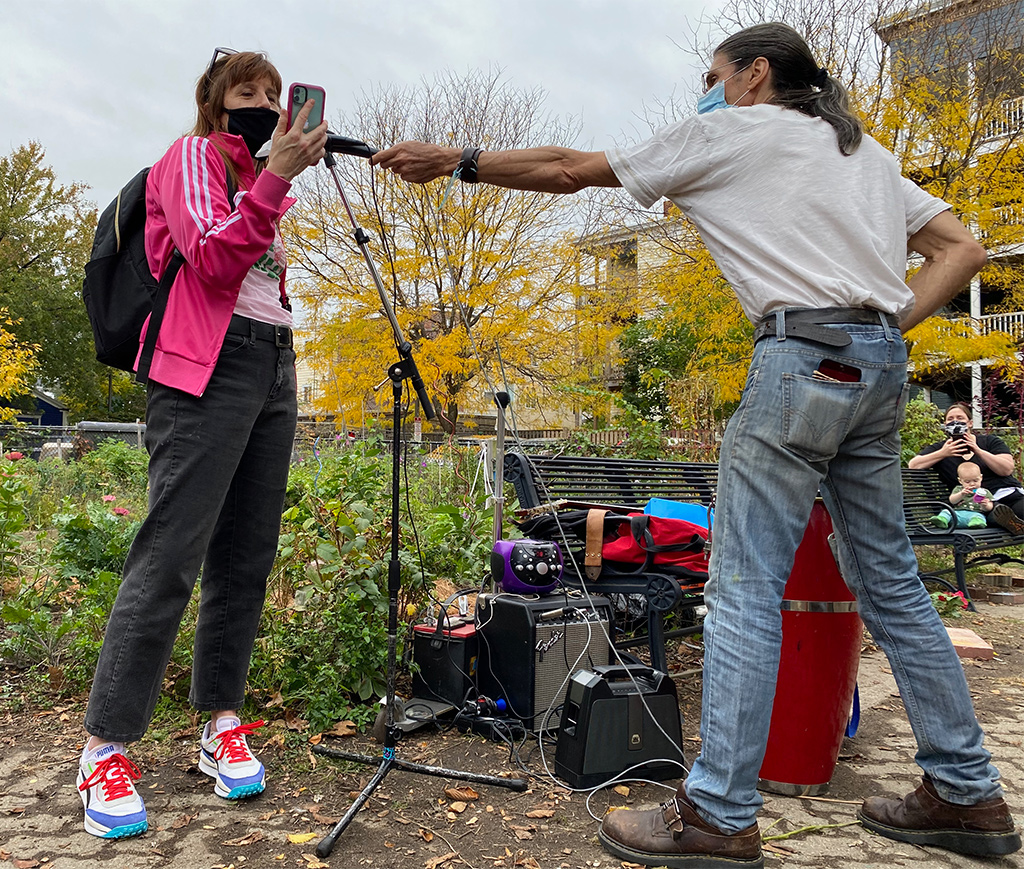
Rafael Medina ensures Gilmore Tamny is heard during the livestreamed event. (Photo: Marc Levy)
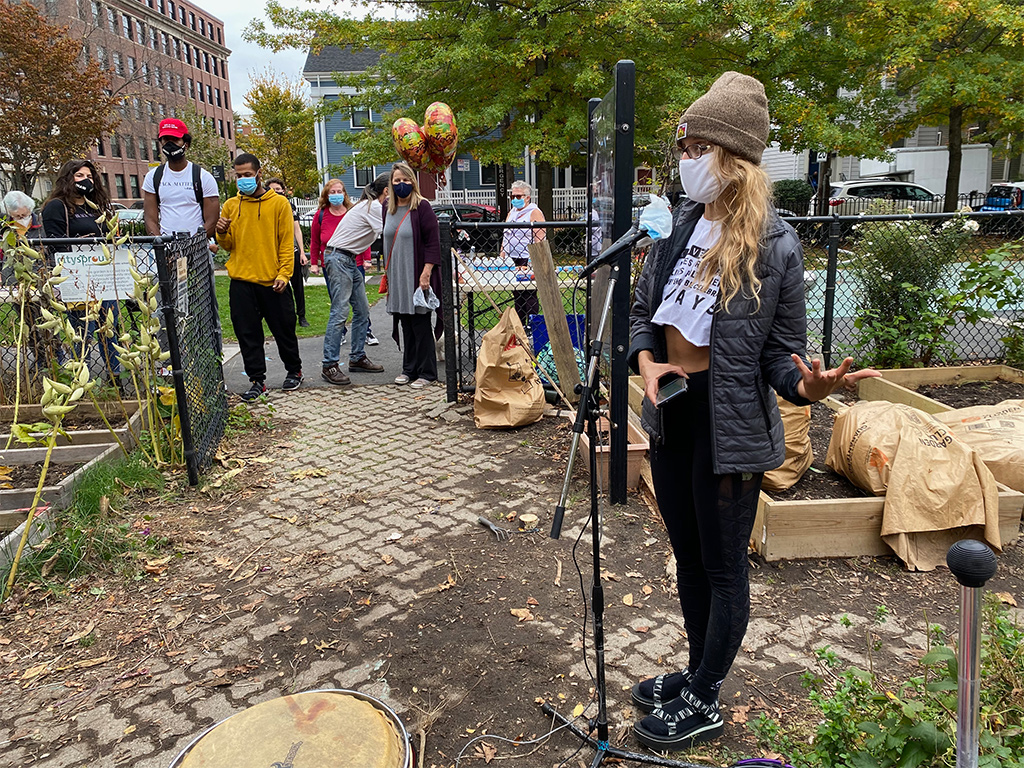
MIT librarian S. Kohler explains the work she’s preparing to read. (Photo: Marc Levy)
After forming in August, the group was told by the garden’s resident overseer in late September “we could help clean up the garden” in addition to working three plots for the Community Arts Center and CitySprouts program, Bee said. They also took to Zoom to coordinate growing on raised beds at the Margaret Fuller House and Tobin School, Rizvi said, and have partners in Cambridge City Growers, which formed in April, and Filling in the Gaps Cambridge, which wants to reform the community gardens system.
“We were trying to figure out how to get more plots, and ran into roadblocks and barriers,” Carrasquillo said.
Official acknowledgments
They also connected with Watkins and Jennifer Letourneau, director of the city’s Conservation Commission within the DPW and, for 18 years, the lone, full-time head of the community garden program – which is supposed to be a part-time position.
Watkins said her department was interested in the Gardenerz proposal of “a more communal gardening experience that can appeal to more residents, particularly those that may have less gardening experience, as opposed to the more traditional approach of individual plots, which works well for a number of our existing gardeners … The community garden program is truly a great resource for residents, and we want to make it available for and appealing to as many people as we can.”
“They have brought a lot of interest and excitement into the garden,” Watkins said, and the department is “exploring options for supporting the efforts of the Crab Apple Gardenerz, while also continuing to support folks that wish to garden individually.”
The problems the Gardenerz encountered in getting started are also not new to city officials, Letourneau said Friday. “We do know the transparency piece is an issue, and we are trying to rectify that as quickly as we can,” she said.
An electronic system in which “everything is fully transparent” has been in the works for years, slowed by the inevitable processes of working with a municipal system with limited bandwidth for tech projects, Letourneau said. “We were really close right when Covid hit [and priorities became] ‘only the most important things right now, please.’ Totally understandable.”
A proposal for a community garden signup and scheduling app is due back from Woburn-based PeopleGIS, and Letourneau said she hopes for a green light. “But I don’t have a timeframe,” she said.
Reaping the benefits
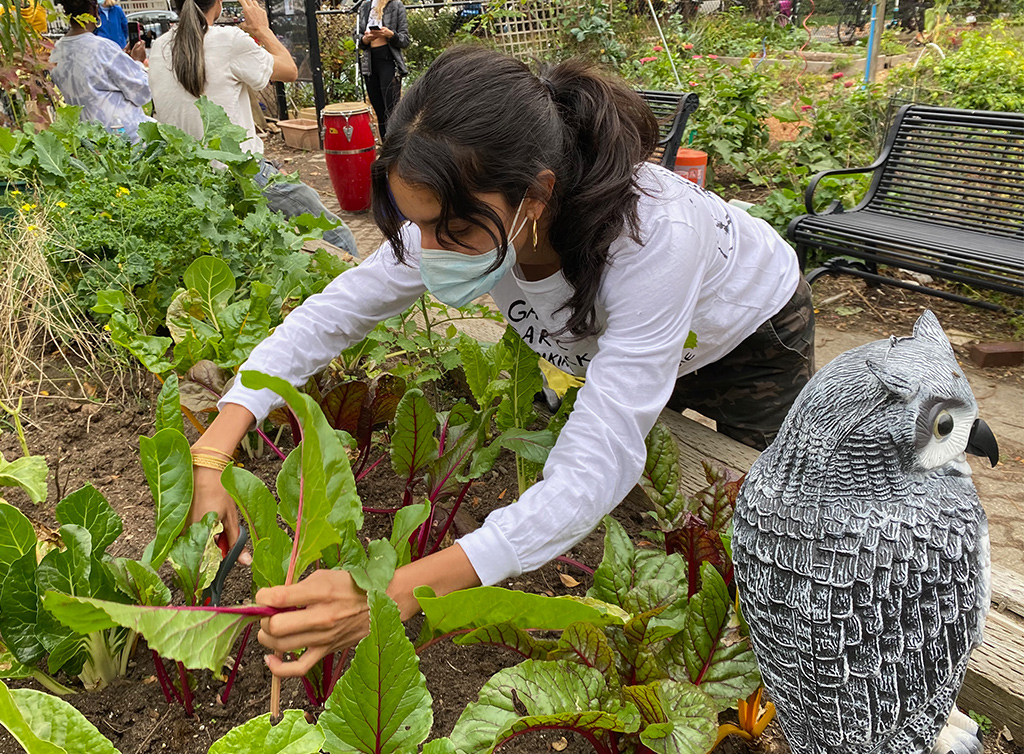
Rizvi cuts Swiss chard to hand out for free during Poets In The Garden. (Photo: Marc Levy)
The Gardenerz have distributed crops of that mint, Swiss chard and tomatoes, kale, squash and cucumbers two or three times just in the short time it’s existed, the group said, and has gathered a corps of volunteers to help. “These gardens bring people together,” said Hatch Sterrett, a volunteer who also came to the October poetry event. “After the Trump era and not knowing what’s true, there’s something good coming out of this polarized nonsense.”
The Port is also the most diverse neighborhood in Cambridge, but neither the peaceful act of growing produce, a good cause nor neighborhood demographics spared the Gardenerz from a call to police. “We had introduced ourselves so many times,” Rizvi said. “We realized this is probably cultural. People are flustered by us coming together. But it’s hard to separate that from race.”
Poets in the Garden was held not just to celebrate, but to flaunt community in the face of fears that the police would be called or just show up on their own – which Bee was pretty sure they did Oct. 24, watching the event while parked across the street. (A police spokesman didn’t answer immediately when asked about this.) From a police perspective there wouldn’t be much to see: Bee recited, as well as poets such as MIT librarian S. Kohler, artist and musician Gilmore Tamny and Carrasquillo’s schoolmate at the Fletcher Maynard Academy and now head of its Qualls Academy, Elon Fyfield. (Also known as the rapper Lizzle4.) There was a table for snacks, set out by Rizvi. There was that straight-from-the-earth food giveaway, also overseen by Rizvi as Bee played emcee and harangued her happy audience: “I don’t want to see this Swiss chard here at the end of the day.”
The group plans another Poets In The Garden when weather allows next year, and the last Tea in the Garden was planned for Oct. 31.
“Black and brown people need to be in allowed in this garden,” Bee said. “We want to be present in an improbable place.”



